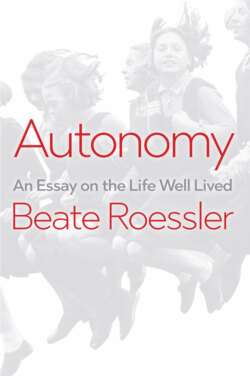Читать книгу Autonomy - Beate Roessler - Страница 21
The ambivalent self
ОглавлениеThe magnificent opening of Richard Ford’s novel The Lay of the Land describes the protagonist, Frank Bascombe, reading a report in the morning paper about Don-Houston Clevinger, a “disgruntled nursing student” who burst into a classroom full of students taking a test, pointed his weapon at the attendant professor, and asked, “Are you ready to meet your Maker?,” to which the professor replied, “blinking her periwinkle eyes in curiosity only twice, ‘Yes. Yes, I think I am.’” At this point, Mr Clevinger shot first her and then himself. Bascombe is plunged into deep reflection by this “sad and dreary conundrum.” He would have answered Mr Clevinger’s question differently: “You know, not really. I guess not. Not quite yet.” He would have immediately started thinking about all the things that he really might have liked to do: “Faced with Mr. Clevinger’s question and a little pushed for time, I’m sure I would’ve begun soundlessly inventorying all the things I hadn’t done yet – fucked a movie star, adopted Vietnamese orphan twins and sent them to Williams, hiked the Appalachian Trail, brought help to a benighted, drought-ravaged African nation, learned German [. . .]. Voted Republican.”34
Over the course of nearly 500 pages, and with a light and subtle touch, Ford’s novel addresses nearly all of the great human themes: the threat of disease (Frank Bascombe has cancer), frustrated love (his wife has left him), fate (the presumed-dead husband of Frank’s second wife returns home), estrangement (his son lives and works in a completely different social world), the horrors of aging. It is also a masterwork of socio-critical analysis. There are obviously a multitude of ways to interpret this kind of opening to this kind of novel – for it is also concerned with the question of how to live one’s life; with the pursuit of a life well lived, even in the face of a terminal illness; with the fear of having made the wrong decisions, having mishandled, misinterpreted, misunderstood one’s relationships. Hence we can say that the opening of this novel is also a study in coping with ambivalences.
Frank Bascombe’s musings on the ambivalences of life are able to wonderfully illustrate the complexity of his self, of what it means when one’s self is not completely harmonious and integrated. Bascombe does not live in profound ambivalence, and the fact that he names so many desires and intentions clearly gives an aspect of irony to each individual one. But it remains the case that if someone put a gun to his head, he could list off a richly contradictory conglomeration of differently attractive forms of life, differently meaningful projects, conflicting ego-ideals. The fact that “flat-footed, unsubtle fate”35 can put us, again and again, in situations that shock the boundaries of our self and the foundations of our identity only goes to show that this self and this identity are more complex and fragmented than a purist theory of ambivalence is able to articulate.
This confusing, contradictory conglomeration is part of Frank Bascombe. It would obviously be wrong to describe his unrealized plans and desires as externalized, alienated desires that are externalized and alienated because he does not pursue them. Frank Bascombe has not completely rejected these unrealized plans and desires, nor do they appear to be random mental events.36 If they are his own desires, thoughts, and reflections, then in any case they are certainly his, and he would have had good reasons for each and every one. They evidently spring from his biography, they make up his personality, and yet they have not motivated or guided his actions. How complex is Bascombe’s self? How much contradiction can a self, an identity endure? And how ambivalent can an autonomous person be before they become incapable of acting?
The first step toward answering these questions refers to something purist theories lose sight of, namely the fact that if something is my desire, then it is my desire, even if I do not pursue it. Incidentally, the same is true of my reasons, which may not be at all persuasive to another person. They are my reasons, desires, and reflections, and not someone else’s – at least in this sense, they are not externalized. Even the desires I reject are mine more than they are yours, and they are more than and different from my own headache. Obviously, there are many different ways that I can react to the desires, reflections, and attitudes I have that do not guide my actions. I can accept them. I can even approve of them (although this does not really work with pain). I can agree with them, even if they are not effective. Frankfurt writes that “we wholeheartedly desire to be wholehearted.”37 This seems to be both empirically overstated and normatively unconvincing. Between identifying wholeheartedly with a desire and completely externalizing a desire that does not motivate us to act, there is a whole phenomenological spectrum of different attitudes that we can have toward our conflicting desires, our will, our self. We can be tolerant of ego-ideals. We can accept that we also have good reasons for desires we cannot realize. We can recognize that the world is not set up in a way that would allow us to be both a poet and a farmer. We can also decide something and stand completely behind our decision – and still lie awake at night in this certainty. This critique of the normative ideal of acting wholeheartedly does not mean that we only ever do things or stand behind our projects half-heartedly. Frank Bascombe is not someone who acts half-heartedly. My critique of this ideal only means that we can never completely reconcile our conflicting, ambivalent identities, that the self remains complex.
